

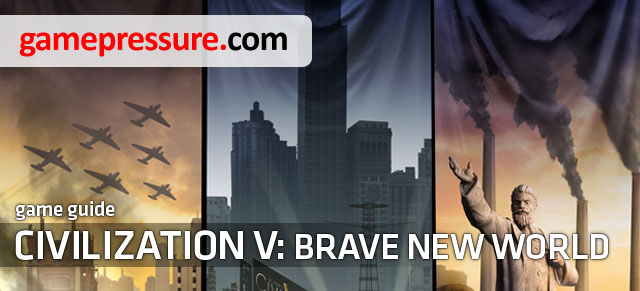
Have you ever wanted to divide and rule? Or maybe you wanted to destroy all of the other nation on the earth? Now, Sid Meyer's Civilization makes that possible. The Brave New World expansion pack allows you to use many new mechanisms that ill allow you to have even greater and impact on the matters of this world. Will you give birth to a civilization that will stand the test of time?
Among others, in this guide you can find:
Legend:
Dawid "Kthaara" Zgud

In this expansion pack, new kind of help to the cities and moneymaking was introduced. These are the trade routes. On the status bar, they are symbolized by two loping arrows, the number that stands for the available trade units and available routes.
Trade routes can be delineated on both land and (for which you need the technology of Animal Husbandry, for the Caravan production),and see (sailing, for the production of a Transport Vessel), and both within your territory and outside of it. The trade routes extend for 20 hexagons from your city. There are technologies that you can discover and improvements to implement (e.g. Caravanserai and Port) which increase the distance and the income.
There is a lasting time to each trade route. At the beginning, the time is 30 turns. Then, the times may vary depending on the activity along that route, discovering of new technologies and other. Once specified a trade route cannot be cancelled and you need to wait for it to terminate.
Once you accept a trade route, its parameters will not change until it terminates. This means that if you, for example discover a new luxury resource, that you could make money on, it will not be taken into account until you establish a trade route.
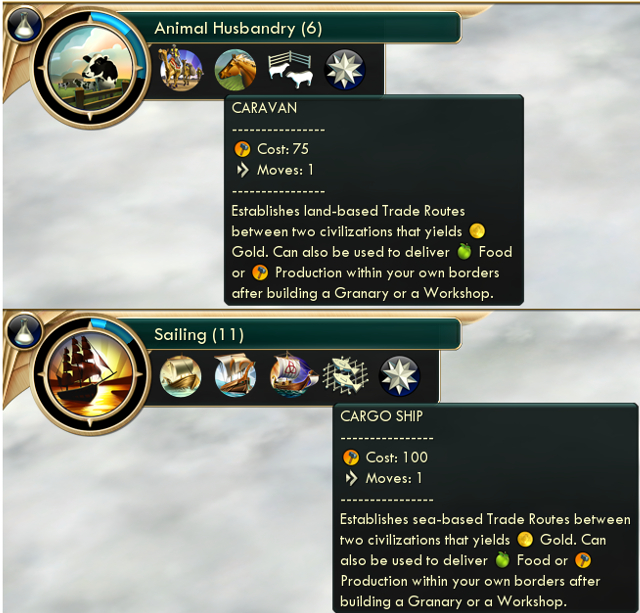 Basic trade technologies
Basic trade technologiesThe below technologies have the bearing on the trade routes.
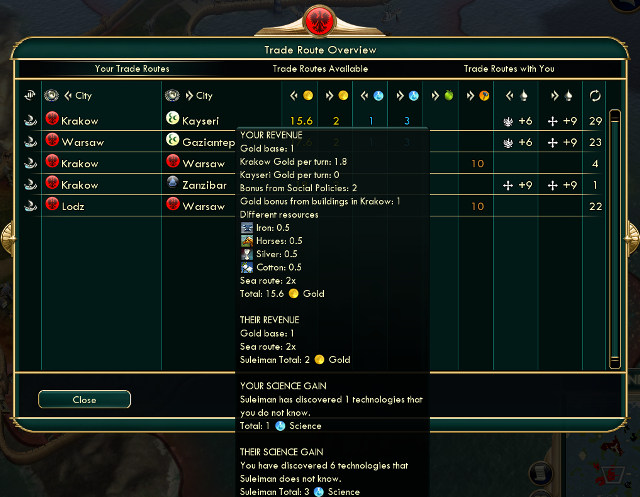
The international routes (the ones in the above screenshot lead to Kayseri, Gaziantep and Zanzibar) can be established each time another player's city is within reach, and you have an empty slot for a trade route. This gives you mainly gold.
Additionally, civilizations receive half of the science points for each exchanged technology. This means that, if you have made two discoveries that your opponent does not yet have access t. and you establish with him exchange via a trade route, he will receive additionally one science point per turn. This also works the other way round: if, both you and the opponent, have access to two technologies unknown to the other, each one of you will receive a science point. The amount of science points is rounded up.
In the very same way, you can export your religion. The Cities that already follow some different piety, exert pressure on the cities at the other end of the route. If, every city has its own religion then the influence varies and cities will gain/lose followers to the other piety. .
As you can see, trade routes may help you increase your wealth . Still, there are other elements that can effectively discourage trade. If the difference in the technological advancement is big, your opponent (or you, but then it is good) may earn a lot of science points, which will increase his development rate. Still, this aspect loses its value with time. Once you reach Renaissance, even ten science points do not make much difference because, if you take a good care of erecting the right buildings, your science points probably way exceed two hundred. In the next Epochs you probably have even more.
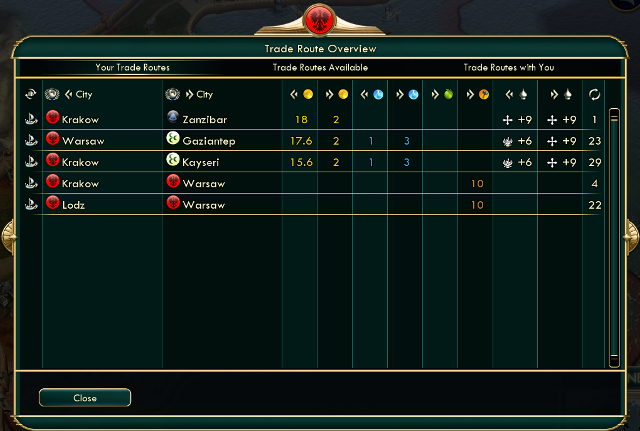
The internal routes (the ones in the above screenshot lead from Krakow and Lodz to Warsaw) are used for different purposes - to help your own cities with their enterprises. They are subject to the same rules that apply to the international routes and, additional ones described below.
The aim of the internal routes is to supply food or manufacture to the needy cities. In order to supply the right kind of resource, you need to have the right kind of building on the city that you depart from. In the case of food it is the Granary, and the Workshop for manufacture.
The city of departure in no way suffers from this kind of help. This does not decrease its pool of food or manufacture. The only cost it has to bear is the cost of the trade vessel, and an occupied slot for a trade route.
Internal trade routes are very helpful for the developing cities, e.g. for the newly started ones. Thanks to the routes, it is possible to help at the construction of buildings or facilitate their natural growth. Dispatching several routes with manufacture to one city, effectively reinforces the building of wonders.
Tourism is an absolutely new domain that supplanted cultural victory present in the previous installments of the game. Now, in order to win culturally, you need to bring the rest of the world down to their needs in awe and amazement with your heritage, achievements and masterpieces.
You can now build buildings with the available spaces for Great Works. A Great Work may be a Work of Writing, a Painting or a Piece of Music, but also Artifacts of the ancient cultures, which you can excavate and put in the proper fields.
From now on, you will have three Great Artisans in the game. They can create either a Great Work, or contribute to the development in a different way. . Each way of using the Great Artisan causes him to disappear.
They function as the National Wonders (you can only have one of each kind). You can build an Artists' city and build all three in one place. You will then dispatch six workers, to write, compose or paint and maybe one of them will become an Artist. Still, such a city is not productive when it comes to the remaining fields.
It is a much better idea to build each of the Guilds in a different city. The governor automatically dispatches workers for them, if the population is at the right level in the city (around 8-10 citizens) and the manual dispatching of specialists is off. Of course, the city must meet the requirement and feed all of its citizens.
Archeologists are special units that become available after you examine a technology from the Industrial Era - Archeology. This allows you to establish archeological works in the right areas which, when successful, give you an Artifact of the long-forgotten cultures. It works like a Masterpiece.
Archeological sites can be created after you examine Archeology. Their numbers depend on how big the map is. On the biggest one, there are 50 available, plus a dozen or so of the hidden ones. You gain access to these after you have fulfilled all of the government system of the Exploration branch.
When your empire creates its first Great Work, it will start to generate tourism. Visitors from another country will want to see it, read it or hear it.
When you have several great works, from different historical periods, and from different countries, in your country, you can try increasing your tourism inflow.
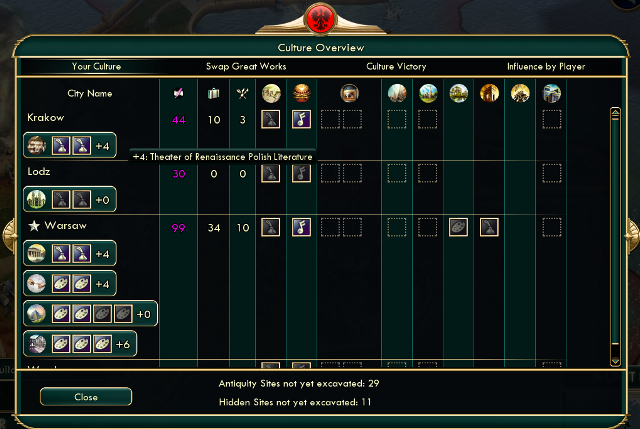 An example of how to reinforce tourism
An example of how to reinforce tourismIf, in a given object (A Wonder or a Museum) you can place more than one Great Work, then this object may generate additional tourism due to the combination of works of art contained in it. Thanks to such elements, it is easier to achieve tourism. Each one of such structures has its unique combination required to achieve a bonus.
For example, if you put two literary works of art originating in the same country and in the same historical period in Globe Theater, you will receive to additional tourism points, which you can increased with correct buildings and social systems.
Most of the buildings, however, require works of art of other cultures. For example The Louvre requires two works of art and two artifacts to ensure you with a bonus. And each of these needs to originate in a different historical period. This cannot be achieved without the international cultural exchange. You can exchange a work of literary art, an artistic work of art or an Ancient Artifact. Musical works of art cannot be exchanged for a simple reason - you can store them in Opera houses only, and they can store single works of arts that do not provide you with a bonus.
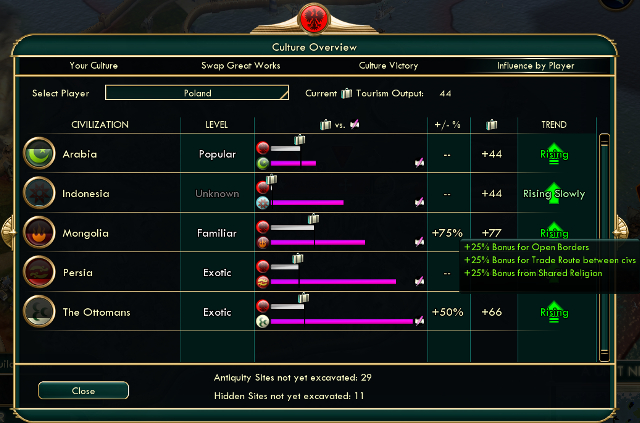 The window of your influence on the neighboring civilizations
The window of your influence on the neighboring civilizationsTourism can be checked out in the tourism overview that includes, among others, your influence on the other civilizations.
Your tourism points are accumulated in the pool of the neighboring countries. The more tourism you have, the faster it grows. Tourism can be compared to a sword in the cultural clash. If your tourism points exceed the accumulated culture pool of another empire, you will gain influence on that empire, which nears you to the peaceful completion of this game.
If that country performs an action in relation to your empire, and it is not a friendly action, tourists will rebel. This can lead to the cities of the foreign empire will start siding with you. The Ideology influences this process additionally - if the ideologies of the countries are different, the process will be faster and more violent.
If you compare tourism to sword, then culture is the shield. First of all, the larger reserve of culture you have at your disposal, the more difficult you are to influence by the other countries. Apart from that, if your culture growth rate is higher than the tourism growth rate of the other countries, you rather are not going to face such a threat.
Tourism bonuses are awarded to a country that engages itself in active politics towards another country - it trades with that country, has open borders or shares religion with that country. Thanks to this, the interest in your country as a destination will become even higher.
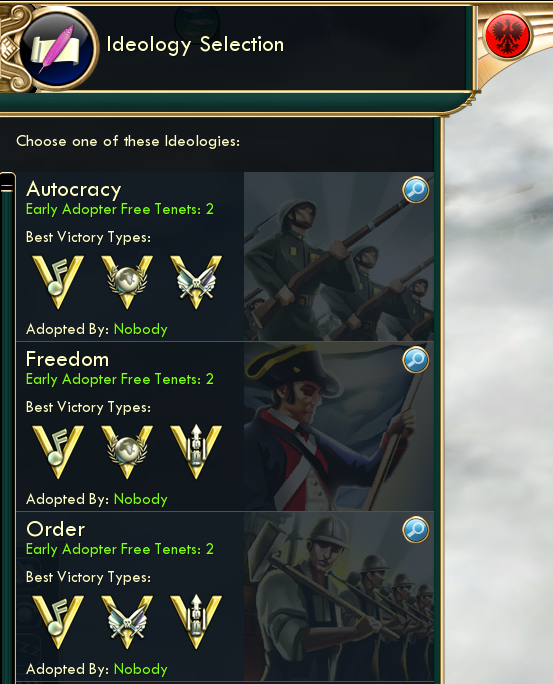 Ideology selection
Ideology selectionIdeology is a powerful tool for the shaping of your country. Thanks to it, you can chose the direction in which your citizens will follow. Access to the Ideology tree remains locked until you build three Factories (which you can do after you have discovered Industrialization) or you will not enter the Modern Era, whichever happens in the first place.
Once you achieve the requisite development level, you will be able to choose one of three ideologies: Autocracy, Freedom and Order- they originate in the three trees of social policies available in the previous expansion pack. It is a good idea to hurry and be the first one to achieve an ideology - the first one receives two free tenets.
Ideology gives you a big boost in the development. Thanks to this, you can revitalize a country that leads a hand-to-mouth existence, as long as your cultural development is high. In comparison with the bonuses that an ideology gives the political system bonuses are negligible.
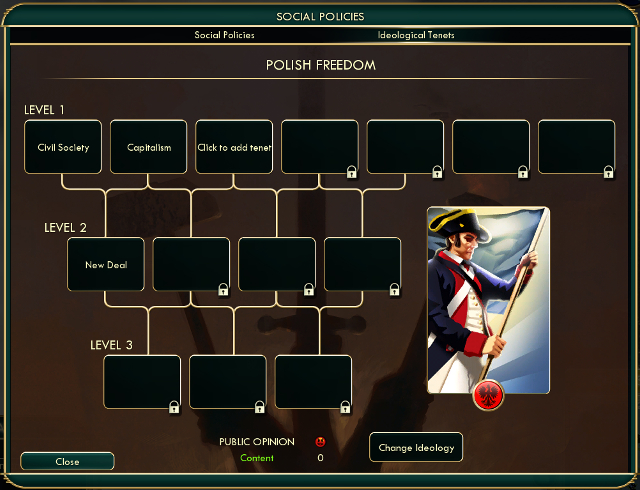
Ideology is based on the selection of tenets, that your society will follow. There are three levels of tenets, where each next ones gives better results. The above diagram defines the way of to acquire them. If you fill the two fields in the uppermost row, you can accept a tenet of the second row and, after you acquire two tenets of the second row, you can accept a tenet of the third row.
The element common to all the ideologies is the Social Healthcare System, that grants +to happiness for every National Wonder.
Autocracy is an ideology based on the personality cult. You are a dictator who rules the country with a rod of iron. Thanks to this ideology, the country fares better in the field of culture, diplomacy, military. This is not to say that, if you chose this direction, you cannot win in any other way, but this does not win you any bonuses.
This is taken from the real world- the path of Autocracy is based on the tenets of various dictators all over the world. This king of rule is usually based on the strong support from the army and terrorizing the society.
If you choose this ideology you will be able to build Prora (after you discover Flight).
Choose this ideology if you know that you stand no chance against the other players in the technological race . If you intend to win as the head of the UN, thanks to this ideology, this is going to be a bit easier. An additional advantage is the possibility to help your armies if you intend to wage a war.
The social tenets of the first level allow you to increase the might of the military state thanks to bringing down the price of units and increasing their strength. The City-States will be able to double their numbers, the spies will be twice as fast while doing their job and the citizens will enjoy the castle in the city. Additionally, for each Great Artist you may be granted a bonus to tourism in the known empires.
The social tenets of the second level are discernibly stronger and they will allow you to decrease the cost of units, increase the effectiveness of the capital, increase the happiness with the barracks and other military installations, and courts. Thanks to these tenets, , the units will gain additional protection, movement and abilities. They will also be built faster due to the limited costs of their production.
The most powerful tenets of the third level unlock such abilities as increased influence on the City-States, increase in the strength in battle and increasing tourism in your allies.
Selection of Freedom will result in a liberal society. Using the original countries where similar tenets are followed, it can be said that such societies are cultured, creative and open minded.
The path of Freedom is based on the societies of the widely-understood West
Thanks to the selection of Freedom you can build the Statue of Liberty (after you discover Replaceable Parts).
If you have chosen Freedom as your ideology, this means that you are going to attempt victory in the race to Alpha Centauri. The technological victory will become much easier with this ideology. The additional advantage to this choice is the UN which you can use to your aid.
Thanks to the tenets of the first level, you can achieve large bonuses to happiness ,to the sped of appearance of Great People and to culture. Additionally, this will make the work of your spies in the free City-States and you will limit food consumption by the specialists.
The second level tenets give you access to the following bonuses: decrease in social unhappiness for specialists, increase happiness for some buildings, increase production from fields created by the Great People (Manufacture, Academy, Holy Place, Customs Service) and provide free units and decrease the costs of their production.
The third-level tenets give the most powerful effects. Among others: increase of income in City-States with a trade route, increase the generated tourism and allow buying of the Spaceship parts for gold.
The path of Order will fill the orderly societies with social layering for the peasants, workers and intelligentsia. Thanks to accepting this ideology, the state will witness the growth of social culture, expenditures for the army and a slight improvement in the quality of scientific research.
As based on the real world Order is Communism but in its idealized version - without dictators omnipresent party (although it exists, as such) and the similar elements thanks to which Marks's communism failed.
Thanks to the Order it is possible to erect the Kremlin (after the invention of railway).
Order is an ideal choice if you do not want to win peacefully. Thanks to this path, you can simply flood the enemy with considerably reinforced units. Additionally, they will be more modern thanks to the research bonus although the technological victory cannot your main aim.
The tenets of the first level can provide you with a bonus to the speed of appearing Great People to the happiness with monuments and factory buildings, decrease the cost of buildings in gold, provide advantage in counter-intelligence and increase the strength of your army on allied terrains.
The tenets of the second level also give you bonuses to happiness, this time of the scientific buildings, increase the production and income from the cities. Additionally, increase tourism, make factories generate science points and cities will have three citizens from the onset.
The third level of the Order tenets provide the following: increase in tourism, increase in the income of science, provides free Court after seizing a city and makes the Great Engineers can finish the elements for the Spaceship.
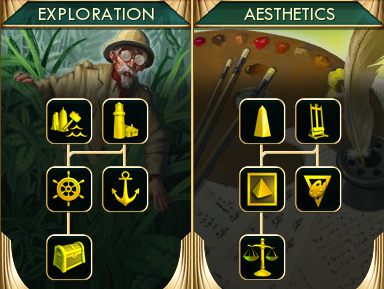 New Social Policies trees
New Social Policies treesThe new expansion pack gets rid of three old social policy trees that included elements that can now be found in Ideologies. One of these places, in the social policies view has been replaced with the Ideology view, and in the other two, there are two trees of policy now: Aesthetics and Exploration.
This tree allows considerable increase in the cultural efficiency of the State. Thanks to it, you will learn new social policies faster. Requires Classical Era.
Accepting this branch increases, automatically, the speed of creating Great Writers, Musicians and Artists by 25%, and also unlocks the Uffizi building (after the discovery of Architecture). After you accept all of the elements (i.e. after you spend 6 points,) you receive a bonus of doubling the bonus for Motifs of all buildings that generate tourism and you can by Great Artists for piety, beginning with the Industrial Era.
Elements of the tree:
The Exploration tree may be found useful with empires with coastal cities. Thanks to this, the efficiency of such cities will grow considerably. Requires the Middle Ages.
After you assume this branch, your units will automatically gain one point of movement and your military vessels will receive an additional hexagon to their range of vision. You will also unlock the Louvre (after the discovery of Archeology). Once you have assumed all policies from this tree, you will see the hidden relics of the past on the world map (which will provide you with an advantage in the artifacts) and also you will be able to buy Great Admirals for piety, starting with the Industrial Era.
Elements of the tree:
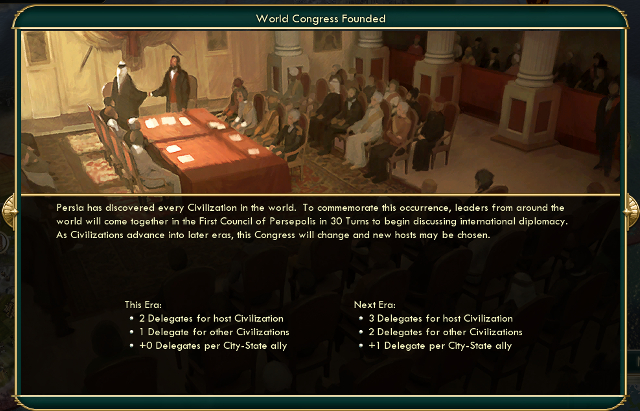 Founding of the World Congress
Founding of the World CongressWorld Congress becomes available if any of the players discovers all civilizations and discovers the Printing Press.
 Required Technology
Required TechnologyThe operation of the World Congress is based on voting resolutions. Resolutions can be proposed by the Host and one, or more members. Each civilization has an appropriate number of votes but, the founder has one vote more and City-States add votes if they are allied with one of the major civilizations. Congress meetings take place every 30 turns but, with time, they occur more and more often.
When you achieve the Atomic Era or any of the remaining players achieves the Information Era earlier, then the World Congress will automatically turn into the United Nations and the option of electing the world's leader will become available, which starts the diplomatic victory.
Resolutions are acts that have bearing on the entire world. They can concern the military elements (e.g. a tax from each unit) or civilian (e.g. ban on using the luxury resources). When you are deciding on the resolution that you would like to have discussed in the session, you can look up its description to find out what the other civilizations think about it. Some of them can be a disaster in diplomatic terms.
Some resolutions are not available until you discover appropriate technologies or achieve to appropriate level of social development. For example, you cannot implement the world ideology if you still do not have one.
Thanks to resolutions you can:
Resolutions also are for starting Great World Projects. For their completion (they cost a lot of production points and everyone can chip in) each civilization to exceed a threshold will receive a reward. There are three thresholds (places), whose exceeding grants rewards. If you win the contest (i.e. you donate the most of all to a noble cause) you will receive rewards for all three places.
These are the three Great Projects:
From now one, once you have a spy at your disposal, and want to send him to the capital city of a foreign country, you will receive a notification urging you to decide if you want to send him as a spy, or as a diplomat.
Diplomat is a spy that ensures intrigue, but does not steal new technologies. Intrigue is obtaining information, finding out about the plans of the ruler of a given country, and ability to influence that ruler during the World Congress. Diplomats can influence the rulers of the neighbor countries, thanks to bribery. You can bribe the ruler of a country to vote for your cause. This gives you ability to steer the global politics without getting dirt on your hands.
In years 1861-1865 the Civil war was waged in the North America. Each of the sides to the conflict had their own vision of what the country, known today as the United States, should look like. Will you be smart enough to lead your cause to the happy end? Or maybe you will fail and your opponent will fly his standard in the streets of your capital city?
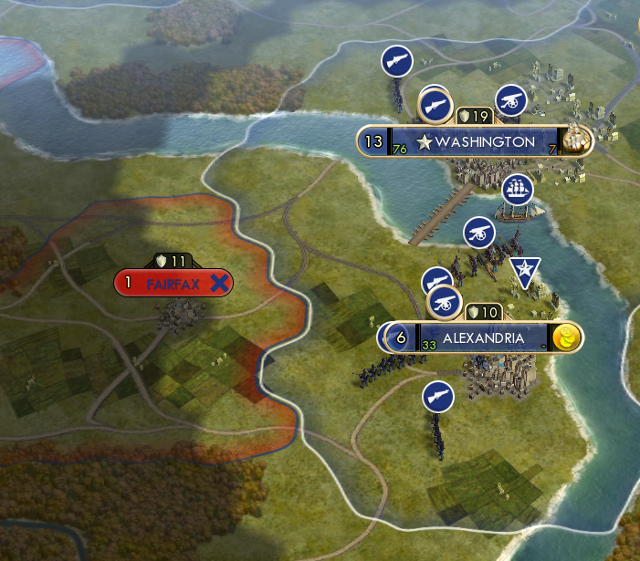 The Capital City of the Union - Washington.
The Capital City of the Union - Washington.The scenario covers the Civil War which lasted for four years and ended in the failure of the Confederate States, as well as in the banning of slavery in the United States. Now you have the opportunity to rewrite history or, improve the results. You need to capture the enemy's capital city before the enemy seizes yours. You have 50 turns to achieve that.
This scenario has special tenets:
There are two sides to choose from: The Union and The Confederation.
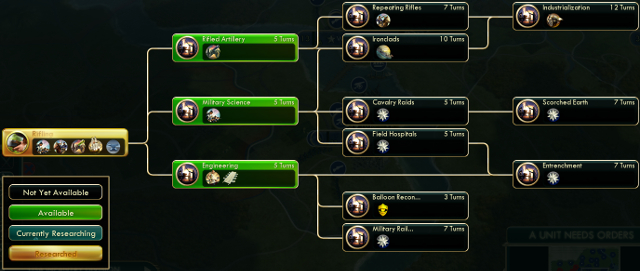 Scientific development tree
Scientific development treeEach of the sides has a dozen or so technologies to research, starting with threading (which has already been researched). Thanks to these discoveries, you will gain access to units like Monitor, Ironclad, Gatling Guns, new infantry and cavalry units or, military engineers.
The last ones can build roads, railways and reinforcements, and pontoon bridges. Having built these, they disappear.
Additionally, researching will allow you to introduce a few improvements to your units, like faster healing, increased defense or the ability to plunder the fields by cavalry and infantry. IT also enables you to equip several units with atmospheric balloons, which improve the range of vision.
While playing as the Union you can start defensively - although your enemy has vast territory and you have more population and resources of Conscripts under your control. That is why you can enlist more soldiers. When your army is big enough, you can start your march to victory towards Richmond - the enemy's capital city. Capturing it before the 50th turn results in victory.
If you assume the role of the leader of the Confederacy, it is important to exert constant pressure on the enemy- a bonus to the defense, ensured by your allies, proves useful here. You need to capture new cities with Barracks- only then you will be able to maintain soldiers that will allow you to reach Washington.
When the Europeans visited and conquered most of the world, in 1881 they turned their eyes to Africa. Will you take on the role of an European leader and start exploring and conquering the unknown lands? Or maybe you will side with the locals and repel the invasion? And, which is even more important, will you emerge victorious?
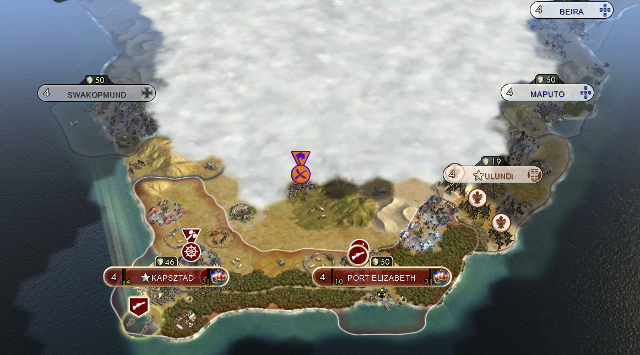
Towards the end of the 19th Century, the colonial empires such as England, Portugal or France had a large portion of the World under their control. Therefore, they turned to Africa, its riches and unexplored lands. You can assume the role of one of such empires and take as much land as you can. As an alternative, you can take on the role of one of the African tribes in order to protect Africa from the invaders. The game I played for points. Your objective is to win as many as possible within 100 turns.
Scenario tenets:
Europeans:
Northern Africa:
Sub-Saharan Africa:
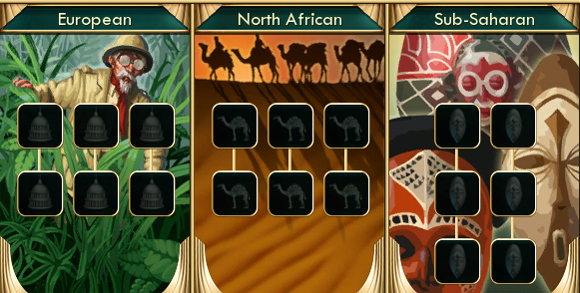 Trees of Policies
Trees of PoliciesIn the scenario, you have access to three trees of cultural development. One for Europeans, one for Northern Africans and one for Sub-Saharan Africans.
European Tree- combat units have -1 to the range of vision and can heal only on their terrain. Systems:
Northern Tree - you gain gold for every destroyed enemy unit. Systems:
Sub-Saharan Tree - you receive culture for each killed unit, excluding the barbarians. Systems:
Europeans should focus on recapturing Suez and building the Railway connecting their cities. It is going to be difficult, due to the fact that the territories of individual nations are spread all around the continent. Military action against the neighboring nations is an alternative.
Africans create their empires basing on the map's tenets - they try to achieve a large income in gold - the more gold the more points.
The South tries to achieve high cultural efficiency - thanks to this they will quickly acquire big amounts of points. The number of points may be increased by creating Great Artists, who, by creating Great Works contribute to the increase in culture.
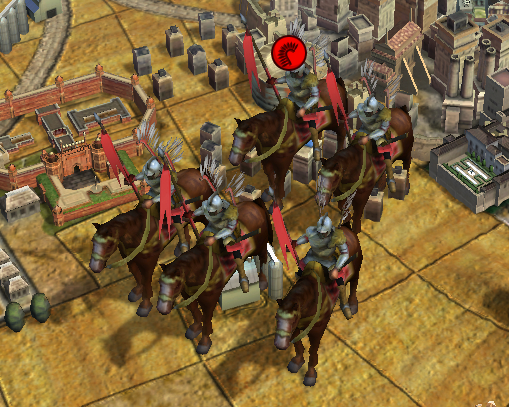 The Polish interiors
The Polish interiorsFor the first time in the history of Civilization, the Polish culture appears in the game. In this chapter, I will try to describe and explain our civilization, as well as to provide useful information concerned with the implementation of its assets into practice.
From the technological point of view, the appearance of Poland is a nice addition - there are all elements included that come to mind in connection with our nation:
The beginning
If you are an old hand in terms of the Civilization, you can easily skip this part of the text.
Poland is the most versatile nation, when it comes to roads to victory. You cannot really say that one victory is easier then another because there is always some bonus that comes with each and every one of them.
At the beginning of the game, your civilization has land preferences. It is an unit of Settlers that, with a high probability, is located at the bank of a river. Around, there probably are grasslands or plains.
Set up the capital city. The river will ensure you, later on, with the possibility of building a water Mill and a Water Electricity Plant. With both of the buildings comes a bonus to production. The Cities (just like in any other example) should be set up in the vicinity of strategic resources and luxury resources, best at the coast, unless the Pangea is your map (this can be looked up in the Escape Menu).
It is a good idea to create two Scouts at the beginning, and dispatch them to scout the surroundings. When it comes to the military units - create as many of them as you need. During the times of peace, only a few of them will do, for current protection of the boundaries against the barbarian hordes (which cause a lot of problems). In the wartime, you should raise their numbers enough to have men to protect all of your cities and to nag at the enemy. Remember, though - conquest costs a lot!
Try to discover as many civilizations as you can. Striving for the discovery of the Printing Press is, by all means, a good idea. This is because, thanks to this, you will be first to start the World Congress which will, later on, provide you with the opportunity of the Diplomatic Victory.
As you build scientific structures, i.e. the Library, the University , Public School or the Observatory You will soon gain advantage over the other civilizations in terms of the discovered technologies. This puts you at a great an advantage - your units are more technologically advanced, your improvements result in more resources and you discover new strategic resources that your opponents do not yet see. Apart from that, you can build new wonders the Pangea yet unavailable to the rival civilizations.
The technologies that you discover should reflect your needs. In general, in the technology tree the more military-oriented technologies are at the bottom of the tree, with the peace and scientific ones somewhere towards the top. One of the first discoveries that you should make is the Wheel to be able to build roads, as well as Optics, which allows you to board your land units. Thanks to this, they will be able to cross patches of water . The rest is up to you entirely - keep reviewing the technology tree to work out your own, unique path of development.
Your cities (best if two of largest production) should focus on building wonders (each one of them provides additional 25 points to the overall score so, it is worthwhile). It is a good idea to trace trade routes to these cities, which will ensure you with additional production points. In the Renaissance Era the cities should be able to build Wonders at the speed of one per several turns.
 Polish Winged Hussars
Polish Winged HussarsThis victory is not too difficult to achieve if you have ensured yourself with the technological advantage. This kind of advantage goes hand in hand with the amount of the manufactured resources (gold, and production) thanks to which you are able to build and maintain quite and army.
If, throughout the gameplay, you have not focused on the technological development, and you somewhat lag behind, the best era to start invading your enemies is the Renaissance. That is when you receive Hussars to command - a swift, polish cavalry unit, which, literally, sweeps the enemy away.
In case of every variant, the conquest is similar. If you happen to have a bone to pick with the enemy, keep dispatching your units to his borders. You cannot encroach the area unless you declare a war on him or sign a Pact to cross borders. Declaration of war should be preceded with consideration on your part. You need to be sure that you will be able to defend the conquered cities (in any case, you will have to build a Courthouse there to bring the unhappiness down), and also that you will be able to seize the enemy empire quickly enough.
This element is also very easy. If you engage yourself in this kind of Victory, you need to allocate Great Artists, Writers and Musicians Guilds in three cities - this way, none of them will suffer from their presence and you will ensure yourself with the influx of new Great People.
In the World Congress it is best to complete, in the first place, projects like World Exhibition and Olympic Games, thanks to which you will receive a boost to culture, which will facilitate discovery of new social systems.
Build wonders, which can hold the Great Works (e.g. Globe Theater or the Louvre) and fill them to receive additional culture points from the aspect.
This victory becomes available in the Modern Era along with the foundation of the UN. There are no additional arguments here, apart from the ones mentioned in the case of the World Congress- it is simply a good idea to enter alliances with the other City-States that will support you with their votes and help outvote the leader.
At any moment, you can look up, in the victory view, how many votes you currently have and how many you need to ensure victory.
Depends on one thing only - if you can beat your rivals to it. If you are the first to dispatch a shuttle to Alpha Centauri you will win. All in all, the most important thing is not the amount of generated science, but the speed of building of the spaceship elements.
It is worthwhile to build these elements in one city but, when the time is scarce (e.g. the playing time is drawing to an end, i.e. 2050 is near) build them in different cities. Elements function like units - you can move them around. Protect them by all means possible! It is easy to destroy them and costly to restore. Launching the ship ends the game with you as the winner.
In general, your state should be ahead of the other ones when it comes to the technological race. Thanks to this, you will have better units and, which is more important, this will allow you to build many wonders that the rival states will not have the access to.
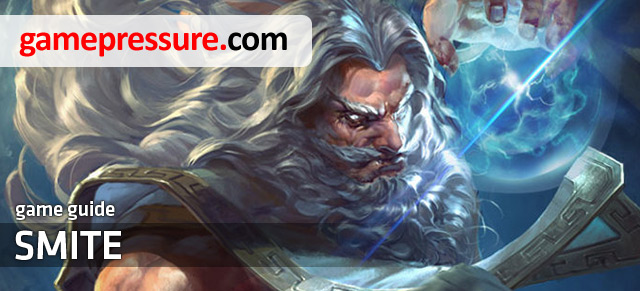


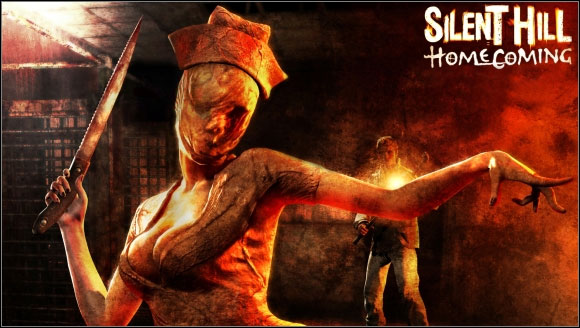
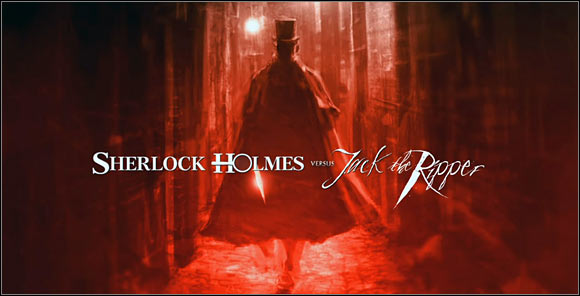 Sherlock Holmes vs. Jack the Ripper Game Guide & Walkthrough
Sherlock Holmes vs. Jack the Ripper Game Guide & Walkthrough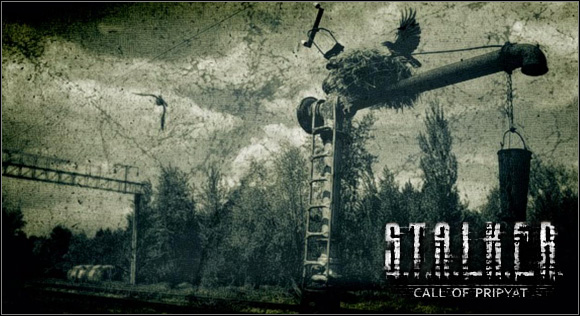 S.T.A.L.K.E.R.: Call of Pripyat Game Guide & Walkthrough
S.T.A.L.K.E.R.: Call of Pripyat Game Guide & Walkthrough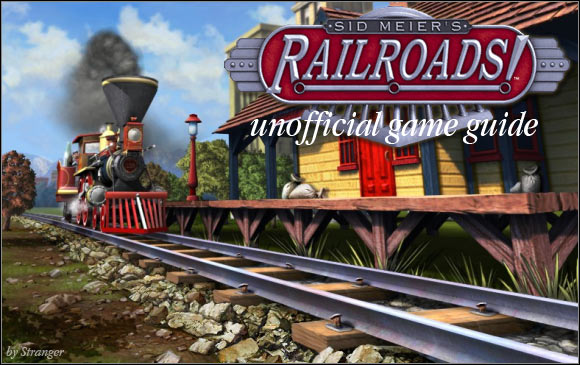 Sid Meiers Railroads! Game Guide & Walkthrough
Sid Meiers Railroads! Game Guide & Walkthrough Sid Meiers Civilization V - Brave New World Game Guide & Walkthrough
Sid Meiers Civilization V - Brave New World Game Guide & Walkthrough Slender: The Arrival Game Guide & Walkthrough
Slender: The Arrival Game Guide & Walkthrough